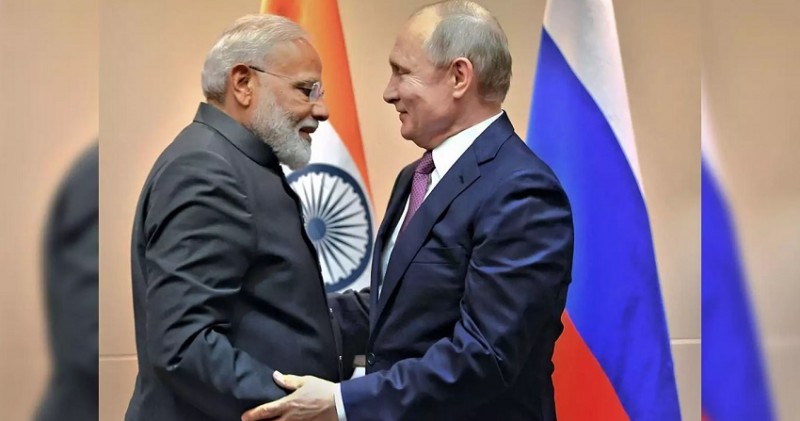
Concerned about the increasing closeness between China and Russia, Indian Prime Minister Narendra Modi is set to visit Moscow next week for talks with President Vladimir Putin. This will be Modi's first trip to Russia since the Kremlin's 2022 invasion of Ukraine.
This visit is significant as it comes two months after Putin's trip to China, his first foreign visit in his new term, highlighting Russia's growing dependence on Beijing—a development that India views with caution.
"The strategic alignment between Russia and China is troubling for India. It's like your best friend teaming up with your rival," said Swasti Rao, an associate fellow at the Manohar Parrikar Institute for Defence Studies and Analyses. "Given these concerns, it's logical for Modi to engage with Putin directly."
This will be Modi's first bilateral visit since securing a third term in office, breaking tradition by prioritizing Russia over neighboring countries like Bhutan, Maldives, and Sri Lanka. This move underscores the importance India places on its relationship with Moscow. India, the world's third-largest oil consumer, heavily relies on Russian crude and military hardware. Meanwhile, relations between China and India have been tense since the 2020 border clashes.
The two leaders are expected to discuss various topics, though no major agreements are anticipated. The agenda includes a logistics supply agreement to enhance military cooperation, discussions on jointly developing a fifth-generation fighter aircraft, and collaboration on nuclear power.
India's Ministry of External Affairs has not commented on the upcoming visit, which is scheduled for July 8-9, coinciding with a separate NATO summit in Washington. The timing of Modi's visit is not linked to the NATO meeting, sources said. After Moscow, Modi is expected to visit Vienna.
The U.S. has been strengthening ties with India to counter China's influence in Asia and has tolerated India's relationship with Russia. Kurt Campbell, the U.S. Deputy Secretary of State, mentioned last week that Washington has discussed India-Russia ties with New Delhi but remains confident in India and aims to expand their relationship.
Modi has avoided in-person summits with Putin over the past two years due to the ongoing conflict in Ukraine. However, India has refrained from condemning Russia's actions, abstaining from UN votes and advocating for diplomacy to resolve the conflict.
Russia's discounted oil sales to India have maintained their relationship, even if it's not as close as during the Soviet era. India has increased its Russian crude purchases more than 20 times compared to 2021, exceeding 2 million barrels a day, saving $13 billion in the process, according to a study by rating agency ICRA.
Putin's meeting with Modi is a diplomatic victory as Russia faces unprecedented sanctions for its actions in Ukraine. Recently, Putin visited North Korea and signed a military defense pact with Kim Jong Un, raising alarms in the U.S. and its allies. He did not attend last year's G20 leaders' meeting in India or the BRICS summit in South Africa.
An unnamed former Indian envoy to Russia stated that ties between New Delhi and Moscow remain stable and strong, despite a slowdown in economic and defense interactions. High-level summits have always been crucial in maintaining their relationship.
"India's engagement with Russia shows that Russia isn't isolated internationally, which is very important for the Kremlin," said Aleksei Zakharov, an expert on India based in Moscow.
India has found ways to resolve trade issues caused by Russia's reduced use of the U.S. dollar, now paying for Russian oil largely in UAE dirhams. They have also addressed problems with Russian companies' rupee accounts in India by allowing these funds to be used for investments in Indian enterprises and purchases of goods like electronics and pharmaceuticals.
However, the commercial relationship remains unbalanced, with India importing about $60 billion annually from Russia while Russia buys less than $5 billion from India. Russia's dominance in India's arms market is also waning as New Delhi turns to Western suppliers and its own defense industry. No major arms deals with Russia have been made in the last three years, and delays in delivering Russian S-400 air defense systems have further pushed India to diversify.
Indian businesses remain cautious about operating in Russia due to sanctions risks and payment difficulties, and top officials and executives have been hesitant to attend major economic gatherings in Russia. Modi's last visit to Russia was in 2019 for an economic forum in Vladivostok.
"This visit is about maintaining the status quo," Zakharov said. "While ties aren't deteriorating, there's no significant drive to improve them either."